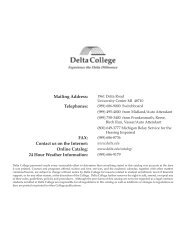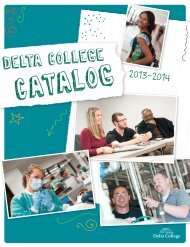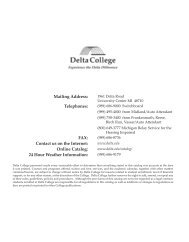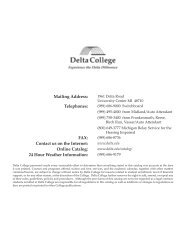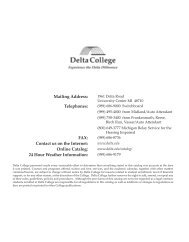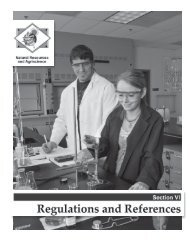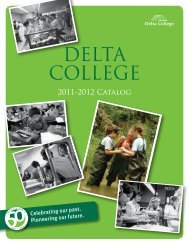2012 - 2013 catalog - Delta College
2012 - 2013 catalog - Delta College
2012 - 2013 catalog - Delta College
You also want an ePaper? Increase the reach of your titles
YUMPU automatically turns print PDFs into web optimized ePapers that Google loves.
BIO 199H Human Heredity And Sexuality -<br />
Honors<br />
4 Sem Hrs<br />
Prerequisites: LEVEL 4 READING and LEVEL 2 WRITING and<br />
permission of the Honors Office. Introduces the fundamental concepts<br />
underlying biology with a focus on heredity and sexuality. Includes cell<br />
biology, inborn errors of metabolism, reproduction and development,<br />
immunology and HIV/AIDS, oncogenes and cancer, plus classical,<br />
population and molecular genetics. Explores the frontiers of health<br />
and medicine including reproductive technologies, biotechnology,<br />
gene therapy, prenatal diagnosis, genetic screening and the bioethics<br />
of the Human Genome Project. Includes case study analysis and<br />
laboratory investigations related to cellular and population genetics<br />
and biotechnology. Provides opportunities to engage in independent<br />
intellectual inquiry to foster deeper learning. Credit may be earned in<br />
BIO 199 or BIO 199H but not in both. (45-45)<br />
BIO 203W General Microbiology 4 Sem Hrs<br />
Prerequisites: BIO 130 or BIO 140 or BIO 152 or BIO 171, or BIO 241<br />
each requiring a “C” (2.0) minimum grade or successful completion of<br />
the BIO 130 competency exam. Surveys the microorganisms associated<br />
with infectious diseases, including the bacteria, viruses, fungi, and<br />
protozoa’s. Emphasizes the health care aspects and the distribution and<br />
activities of microbes as related to the following: microbial nutrition and<br />
anatomy, growth, disease, epidemiology, infection and immunity. Uses<br />
labs that stress aseptic techniques and that develop skills necessary to<br />
handle microbes in health care settings, including the characterization<br />
of unknown microbes. (45-45)<br />
BIO 219 Stream Ecology: Aquatic<br />
Macroinvertebrate Research<br />
2 Sem Hrs<br />
Introduces the physical environmental factors that affect organisms<br />
inhabiting streams as well as human influences on streams. Emphasizes<br />
the energy flow through stream ecosystems along with the lifecycles<br />
and interdependencies of stream animals. Includes fieldwork on at<br />
least four different kinds of streams. Emphasizes interrelationships<br />
of macroinvertebrate communities within specific stream ecosystems.<br />
Includes a weekend field trip with the student paying own expenses.<br />
Credit may be earned in BIO 119 or BIO 219 but not both. (30-0)<br />
BIO 221 Nature Study 4 Sem Hrs<br />
Prerequisite: BIO 111 recommended. Designed to introduce students to<br />
identification of local flora and fauna. Investigates relationships of these<br />
organisms to student’s environment. (45-30)<br />
BIO 230HW Physical Anthropology and<br />
Archeology - Honors<br />
4 Sem Hrs<br />
Prerequisites: LEVEL 4 READING and LEVEL 2 WRITING and<br />
permission of the Honors Office. Introduces the origin and evolution<br />
of humankind’s physical and cultural development. Emphasizes the<br />
evidence and theories of human evolution and a survey of Old World and<br />
New World archeology. Provides opportunities to engage in independent<br />
intellectual inquiry to foster deeper learning. Credit may be earned in<br />
only one of SOC 230, SOC 230H, BIO 230, or BIO 230H. (60-0)<br />
BIO 230W Physical Anthropology and<br />
Archeology<br />
4 Sem Hrs<br />
Prerequisites: READING LEVEL 2 or WRITING LEVEL 2. Introduces the<br />
orign and evolution of humankind’s physical and cultural development.<br />
Emphasizes the evidence and theories of human evolution and a survey<br />
of Old World and New World archeology. Credit may be earned in only<br />
one of SOC 230, SOC 230H, BIO 230, or BIO 230H, but not both. (60-0)<br />
BIO 240 Human Anatomy 4 Sem Hrs<br />
Prerequisite: BIO 171 or permission of instructor. The anatomy of the<br />
human body is presented on an integrated regional basis, supplemented<br />
by relevant histological, embryological, and functional considerations.<br />
The laboratory emphasizes regional dissections of the cat. Designed to<br />
meet the needs of biology majors and pre-professional science curricula,<br />
including all transfer health-related fields. (45-45)<br />
BIO 241 Physiology 4 Sem Hrs<br />
Prerequisite: BIO 171 or BIO 240 or permission of instructor. Background<br />
in anatomy and chemistry is desirable, but not required. Provides<br />
students with an introduction to the functional integration of the major<br />
organ systems of animals, with special emphasis on the human body.<br />
Places emphasis on the ways in which the various systems interact to<br />
maintain homeostasis of the individual. Illustrates through laboratory<br />
experiments both classical and modern approaches to the physiology<br />
of various organ systems. (45-60)<br />
BIO 268 International Studies in Biology 1-4 Sem Hrs<br />
Provides a biologic interpretation of selected world regions with emphasis<br />
on natural history, flora and fauna, and ecological relationships. Includes<br />
class lectures, individual consultation, and international field study.<br />
Expenses for the field study are the responsibility of the student. (15-60,0)<br />
BIO 272W Integrated Biology Review for<br />
Teachers<br />
3 Sem Hrs<br />
Requires previous exposure to college-level chemistry and biology for<br />
this review course. Prepares potential teachers for the Michigan Test for<br />
Teacher Certification (MTTC). Covers topics such as the scientific method,<br />
cell types and cellular function, evolutionary changes and inheritance, the<br />
classification of living things, ecological principles, and ecosystems. Uses<br />
a combination of cooperative learning techniques, debates, discussion,<br />
group activities, a learning portfolio, a poster presentation, individual<br />
presentations, and case studies. (45-0)<br />
BIO 274 Introduction to Biotechnology 2 Sem Hrs<br />
Prerequisites: CHM 111 and BIO 171 or permission of instructor. Gives a<br />
detailed look at cell and molecular biology with a focus on biotechnology.<br />
Explores the following topics: regulation of gene expression and<br />
development, recombinant DNA, gene cloning, PCR, DNA sequencing<br />
and profiling, gene therapy, protein purification, cell culture, cancer<br />
and the use of model organisms. Designed for students interested in<br />
careers in biotechnology, biochemistry, medicine or pharmacy. Meets<br />
requirements of Ferris State University’s Bachelor of Science program<br />
in biotechnology. (30-0)<br />
BIO 290-299 Special Projects in Biology<br />
Computer Aided Design<br />
CAD 114 Introduction to CAD 2 Sem Hrs<br />
Prerequisites: Either DRF 121, ARC 105, or SKDR 101. CST 103 suggested<br />
or basic knowledge of the Windows Operating System. Introduces<br />
2D CAD drawing, including basic drawing and editing commands as<br />
related to architectural, mechanical and civil applications. Studies CAD<br />
system interface, hardware, a current operating system, file management<br />
techniques, creating templates, creating and modifying geometry,<br />
dimension and text styles, block and external reference insertion, model<br />
space/paper space layouts, and plotting techniques. Credit may be earned<br />
in CAD114 or SKCA114 but not in both. (30-15)<br />
CAD 120 Introduction to CAM 3 Sem Hrs<br />
Prerequisites: DRF 104 or DRF 105 or SKDR 101; and CST 103 or CAD<br />
114; or permission of instructor. Introduces the basics in computer<br />
geometry creation including line, arc, curve creation and manipulation.<br />
Gives a foundation to build on advanced CAD/CAM techniques. Instructs<br />
students on file transfer systems from CAD to CAM with emphasis on<br />
proper drawing techniques, including file type-save-transfer. Projects<br />
will be drawn, checked and created on appropriate equipment. Shows<br />
links between CNC machines on the shop floor and their relationship<br />
with the design process. Generates code from created drawings to be<br />
run on Computer Numerical Controlled equipment. Credit may be<br />
earned in CAD 120 or SKCA 120 but not in both. (30-30)<br />
350 <strong>Delta</strong> <strong>College</strong> <strong>2012</strong>-<strong>2013</strong>



